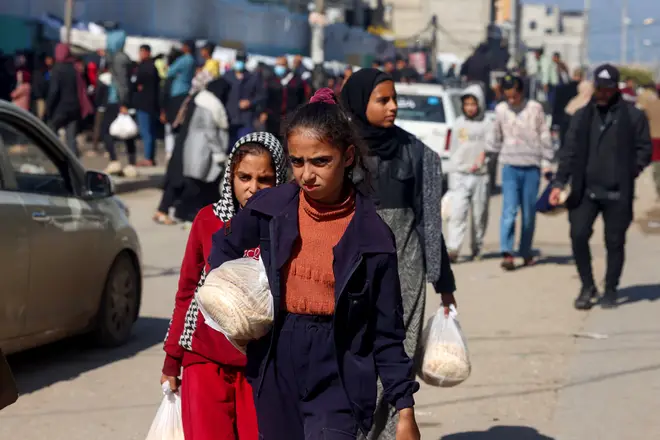
James O'Brien 10am - 1pm
19 February 2024, 07:47 | Updated: 19 February 2024, 08:25

Israel has set a date for the launch of a ground offensive in Rafah, the area of southern Gaza where over a million Palestinians are sheltering.
Israeli leaders said the attack on the city, where it has previously funnelled civilians seeking to escape the violence, would take place on March 10 if the remaining hostages were not returned.
War minister Benny Gantz said: "The world must know, and Hamas leaders must know - if by Ramadan our hostages are not home, the fighting will continue everywhere, to include the Rafah area".
He added that the IDF would fight in "a co-ordinated manner, facilitating the evacuation of civilians in dialogue with our American and Egyptian partners to minimise civilian casualties".
Ramadan begins on March 10 this year. Mr Gantz's comments mark the first time Israel has commented on when its troops would enter Rafah.

Israel has consistently sought to move Palestinians into Rafah, and an estimated two-thirds of the territory's population are thought to be living there.
The army's plans to enter Rafah have previously sparked international concern about civilian deaths.
UN Secretary-General Antonio Guterres said earlier in February that "such an action would exponentially increase what is already a humanitarian nightmare with untold regional consequences."
Israel has been bombarding Rafah with airstrikes even before the ground offensive, with images showing scenes of destruction in the city.
It is unclear what civilian evacuation plan Mr Gantz was referring to, but it may be that Israel expects Egypt to take refugees via the Rafah crossing, which Egypt has previously been reluctant to do.

“They are not dragging it out for political purposes, they’re executing war for policy purposes" says former senior advisor to the U.S Ambassador to Israel Aryeh Lightstone
US president Joe Biden has tried to stop Israel from moving into Rafah without a "credible and executable" plan to protect the lives of civilians.
British Foreign Secretary David Cameron said the UK was "very concerned about what is happening in Rafah because, let's be clear, the people there, many of whom have moved four, five, six times before getting there."
He added: "It really, we think, is impossible to see how you can fight a war amongst these people, there is nowhere for them to go.
"They can't go south into Egypt, they can't go north and back to their homes because many have been destroyed."
"So we are very concerned about the situation and we want Israel to stop and think seriously before it takes any further action," he added.

Cameron says Israel should stop and think seriously before Rafah offensive
"But above all, what we want is an immediate pause in the fighting. We want that pause to lead to a ceasefire, a sustainable ceasefire without a return to further fighting. That is what should happen now.
"We need to get those hostages out, including the British nationals. We need to get the aid in. The best way to do that is to stop the fighting now and turn that into a permanent, sustainable ceasefire."
Israel said on Sunday that it opposes other countries recognising a Palestinian state without direct negotiation with the Israeli government.
"Israel will continue to oppose the unilateral recognition of a Palestinian state. Such recognition in the wake of the Oct 7 massacre will grant a huge, unprecedented reward to terrorism and prevent any future peace accord,” the government said after a Cabinet meeting.
Over 100 hostages of the 240 taken by Hamas during the October 7 attacks that killed 1,200 remain in Gaza.
Some 28,000 people have died in Gaza during the subsequent war, according to the Hamas-linked health ministry. Around 68,000 have been wounded.
Ceasefire talks are ongoing, although mediator Qatar has said that recent progress has not been good.